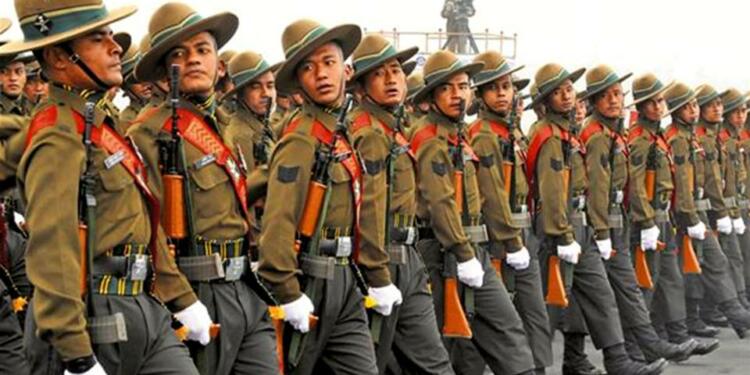According to the Britain-India-Nepal Tripartite Agreement in 1947, the Gorkha regiment of the British Indian Army was made part of the Indian Army. Further, after the Independence, a Treaty of Peace and Friendship between India and Nepal cemented the process to raise Gorkha regiments partly by recruitment from hill districts of Nepal.
Currently, about 32,000 Gorkha Soldiers from Nepal are serving in the Indian Army and the retired soldiers are fully taken care of according to the pensions and organized welfare programs of the army. But, in the modern territorial and political state concept, where security and sovereignty of the nation are constantly threatened, is it right to accept soldiers from a foreign country?
Nepal stalled Gorkhas recruitment
According to the media reports, Nepal has temporarily stalled the recruitment of Gorkhas in the Indian Army under the ‘Agnipath scheme’. Foreign Minister of Nepal, Narayan Khadka, informing the same to India’s ambassador to Nepal, Naveen Srivastava, said that the recruitment of Gorkhas under the Agnipath scheme is not in consonance with the tripartite agreement signed among Nepal, India, and Britain on November 9, 1947.
He further said that the final decision will be taken after wider consultation with political parties and all stakeholders.
Reports suggest that India had approached Nepal for cooperation and approval for the recruitment process. Nepal, raising the concern of four-year recruitment under the Agnipath, stated that the scheme is not in conformity with the provisions of the tripartite agreement of 1947.
History of Gorkhas in the Indian Army
The history of Gorkhas in the Indian Army starts with the conquest of India by the British. In the process of consolidation of powers in India, the British successively launched a conquest march in the neighbouring region of India. In this way, Nepal was attacked in November 1814.
Although Nepal, under the leadership of Gorkhas, fought with valour but the mighty British army was victorious in the end. Later, under the Treaty of Suguali, a definite land boundary was drawn between India and Nepal, and peace was brokered.
After the War, the British senior officials were so inspired by the fighting spirit of the Gorkhas in the Anglo-Nepalese War (November 1814 – March 1816) that they quickly started the procedure to recruit them into the British Army. Thereafter, from 1816 to 1947, Gorkhas remained one of the main pillars of British rule in India.
When the British were kicked out of India, a Britain-India-Nepal Tripartite Agreement in 1947 was signed among India, Nepal, and Great Britain concerning the rights of Gorkhas recruited into the military of the UK and India. According to the tripartite agreement, six of the ten regiments remained as part of the Indian army, while four joined the British Army. Since then the Indian Army regularly recruits Gorkhas from Nepal with special vacancies.
Former Indian Army Chief of Staff Field Marshal Sam Manekshaw explaining the bravery of Gorkha once said, “If a man says he is not afraid of dying, he is either lying or he is a Gorkha.” Gorkhas are the martial racial native to the Indian Subcontinent, residing mostly in Nepal and some regions of India. It is said that when a Gorkha draws his Khukri in anger, he must also draw blood.
Is Recruitment From Nepal A Good Idea?
Their fighting spirit, their loyalty to the army, and their bravery is unquestionable. But, in the modern concept of state, where sovereignty is constantly threatened by enemies, is it right to accept people from other sovereign countries in regular forces?
We have our own Gorkha population. We do have brave people who are training day and night to join the army. Seventy-five years ago, the situation was different when we signed the tripartite agreement. Now, the conditions and environment are totally different.
When we extended the goodwill gesture to Nepal, the Treaty of Peace and Friendship had a different meaning. Nepal was under a monarchy and their foreign policy and security were de facto dependent on India. But, now the conditions are different. They are making alliances with China, they maintain good relations with Pakistan and it has been proven that many Indian separatist forces operate from there.
In this scenario, the security condition of India will always be in a compromised position. Enemies of India may find a convenient route in the form of Army recruitment to transgress in the Indian Army and threaten our security. Pakistan and China have conveniently used Nepal’s territory to ferment Terrorism and Naxalism in India. Further, Nepal has been the epicentre for organized crime against India.
Consequently, it will be in India’s favour to withhold this scheme to recruit army personnel from another sovereign country. Not only under the Agnipath scheme but regular recruitment processes should also be stalled by India and opportunities for Indians should be increased. The terms Britain-India-Nepal Tripartite Agreement 1947 should also be revoked to stop this practice.
Following the realist policy of statecraft, the sovereign Indian state should do away with any tradition which has even 0.1% probability to threaten our national security. Foreign powers should not be allowed to enter the critical security architecture of the nation in any given condition.
Support TFI:
Support us to strengthen the ‘Right’ ideology of cultural nationalism by purchasing the best quality garments from TFI-STORE.COM

























